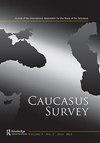走向一个“不文明”的社会?格鲁吉亚的非正规性和民间社会
IF 0.4
Q3 AREA STUDIES
引用次数: 0
摘要
摘要自20世纪90年代初以来,南高加索非政府组织在发展道路上面临着无数挑战。其中,地方性的“社会信息化”——在一定程度上继承自苏联——为该地区平等和开放的公民社会的出现和建立构成了似乎无法克服的许多障碍。本研究探讨了格鲁吉亚共和国正式公民社会与非正式领域之间不稳定的关系。我们认为,学者和决策者都需要密切关注非正规机构,无论其非民事性质如何,在发展中国家的背景下,如何经常成为民间部门的一部分。非正式赞助网络、激进运动和极端主义组织——有些是注册的,有些是非正式的——通常伪装成民间社会组织,在后共产主义国家充当非政府组织的“黑暗面”。这种“不文明”社会之所以蓬勃发展,是因为该地区正式民间社会的民众参与度较低,并破坏了发展强大的民间部门所能取得的潜在成果。本文章由计算机程序翻译,如有差异,请以英文原文为准。
Towards an “uncivil” society? Informality and civil society in Georgia
ABSTRACT Since the early 1990s, the NGO sector in the South Caucasus has faced countless challenges on its road to development. Among these, an endemic “informalisation of society” – to a certain degree inherited from the Soviet Union – posed a seemingly insurmountable number of obstacles for the emergence and establishment of an egalitarian and open civil society in the region. This study explores the uneasy relationship between formal civil society and the informal sphere in the republic of Georgia. We argue that scholars and policy-makers alike need to pay close attention to how informal institutions, regardless of their non-civil nature, often become part of the civil sector in the context of developing countries. Informal patronage networks, radical movements and extremist organizations ̶ some registered and some remaining informal – often pose as civil society organizations, functioning as a “dark” side of NGOisation in post-Communist countries. This “uncivil” society thrives due to the low popular participation in formal civil society in this region and undermines the potential gains to be made by the development of a robust civil sector.
求助全文
通过发布文献求助,成功后即可免费获取论文全文。
去求助
来源期刊

Caucasus Survey
Arts and Humanities-History
CiteScore
1.30
自引率
9.10%
发文量
4
期刊介绍:
Caucasus Survey is a new peer-reviewed, multidisciplinary and independent journal, concerned with the study of the Caucasus – the independent republics of Armenia, Azerbaijan and Georgia, de facto entities in the area and the North Caucasian republics and regions of the Russian Federation. Also covered are issues relating to the Republic of Kalmykia, Crimea, the Cossacks, Nogays, and Caucasian diasporas. Caucasus Survey aims to advance an area studies tradition in the humanities and social sciences about and from the Caucasus, connecting this tradition with core disciplinary concerns in the fields of history, political science, sociology, anthropology, cultural and religious studies, economics, political geography and demography, security, war and peace studies, and social psychology. Research enhancing understanding of the region’s conflicts and relations between the Russian Federation and the Caucasus, internationally and domestically with regard to the North Caucasus, features high in our concerns.
 求助内容:
求助内容: 应助结果提醒方式:
应助结果提醒方式:


